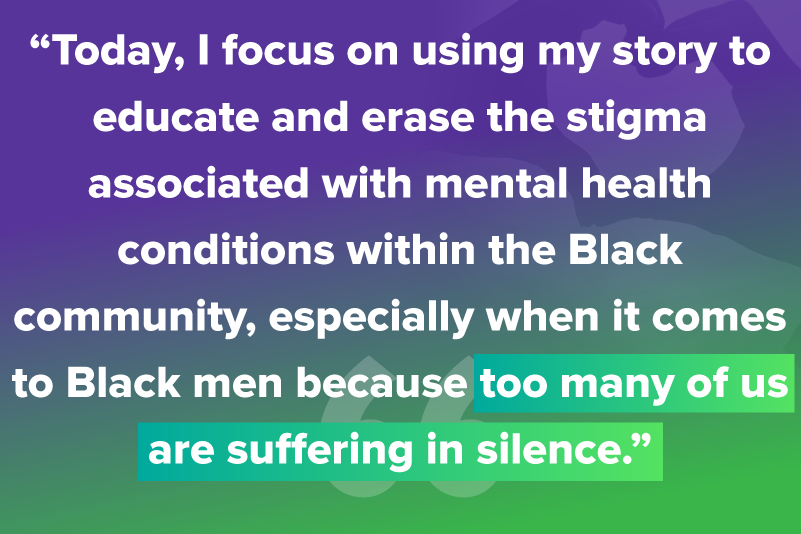July 07, 2020
By Tarrin Morgan II
If you or someone you know is experiencing a mental health, suicide or substance use crisis or emotional distress, reach out 24/7 to the 988 Suicide and Crisis Lifeline (formerly known as the National Suicide Prevention Lifeline) by dialing or texting 988 or using chat services at 988lifeline.org to connect to a trained crisis counselor. You can also get crisis text support via the Crisis Text Line by texting NAMI to 741741.

Like many Black people, I come from a family and community where dealing with emotions and trauma wasn't discussed in private or taught in schools. In the 1990s/early 2000s, if you brought up these subjects in public, then they would make you look "soft," and you would become a target to be made fun of.
Consequently, I held it all in because I thought that was what you were supposed to do. We had individuals in our neighborhood that experienced mental health conditions, but due to us being uninformed, we looked at them as "crazy" and kept them at a distance. I even had the false invincibility mindset that "it would never happen to me." Little did I know that it would indeed happen to me many years later.
Fast forward to when I entered college in 2005, where I turned to alcohol and women as vices to suppress the chaos that was brewing within my brain. My lack of self-awareness didn't allow me to see the emotional damage that I was causing others and myself. Luckily, I had the privilege of becoming a resident assistant, which was the introduction to my mental health education. But I still didn't practice what I preached when it came to managing stress, the importance of self-care and healing from trauma.
It took years for me to mature and stop utilizing vices as a way to distract myself, but I still was not addressing my mental health. In 2017, the years of compartmentalizing and internalizing burst through the mental dam that I built, which resulted in me experiencing anxiety, depression and suicidal ideation for the first time. This was the darkest, most trying moment in my life. However, I had to go through the pain for my purpose to be revealed.
There was never a point in my life that I thought I would become a mental health advocate, but here I am today. This only occurred because I changed my mindset from "why is this happening to me?" to "this is happening for me." I call this period of my life "The Rebirth of the Phoenix" because the old me no longer exists, and I am stronger than ever.
Today, I focus on using my story to educate and erase the stigma associated with mental health conditions within the Black community, especially when it comes to Black men because too many of us are suffering in silence. One of the biggest issues I noticed when I was first becoming acclimated to living with a mental health condition was the lack of culturally competent resources and services for the Black community. So I took the initiative to be the change that I wanted to see.
This birthed the idea of founding the Real Talk Session Series, LLC (RTSS). RTSS is a community-focused media organization that provides culturally competent and easy to digest edutainment (a combination of education and entertainment) content catered to the Black community. Our goal is to deliver easily accessible education to the community and to make a positive impact on education reform, criminal justice reform and mental illness.
RTSS has partnered with NAMI NJ's multicultural advisory group AACT-NOW (African American Community Together NOW) to improve upon and spread the amazing resources that AACT-NOW offers. I am also a member of NAMI, a board member of AACT-NOW and a trained In Our Own Voice (IOOV) presenter.
Through IOOV, I have the opportunity to shine a light on what it is like to be Black with a mental illness in America and I know it is making an impact. When I was first diagnosed, I thought it was a curse, but it was a blessing. I am committed to bringing awareness and service to Black communities across the nation. To those suffering from a mental health condition, just know that you are not alone and your current situation is not your final destination. Yes, it is a tough journey, but you have what it takes to overcome. I am sending nothing but positive vibes to those in a dark place. Please feel free to connect with me on all social media platforms @realtalksessionseries.
Submit To The NAMI Blog
We’re always accepting submissions to the NAMI Blog! We feature the latest research, stories of recovery, ways to end stigma and strategies for living well with mental illness. Most importantly: We feature your voices.
LEARN MORE